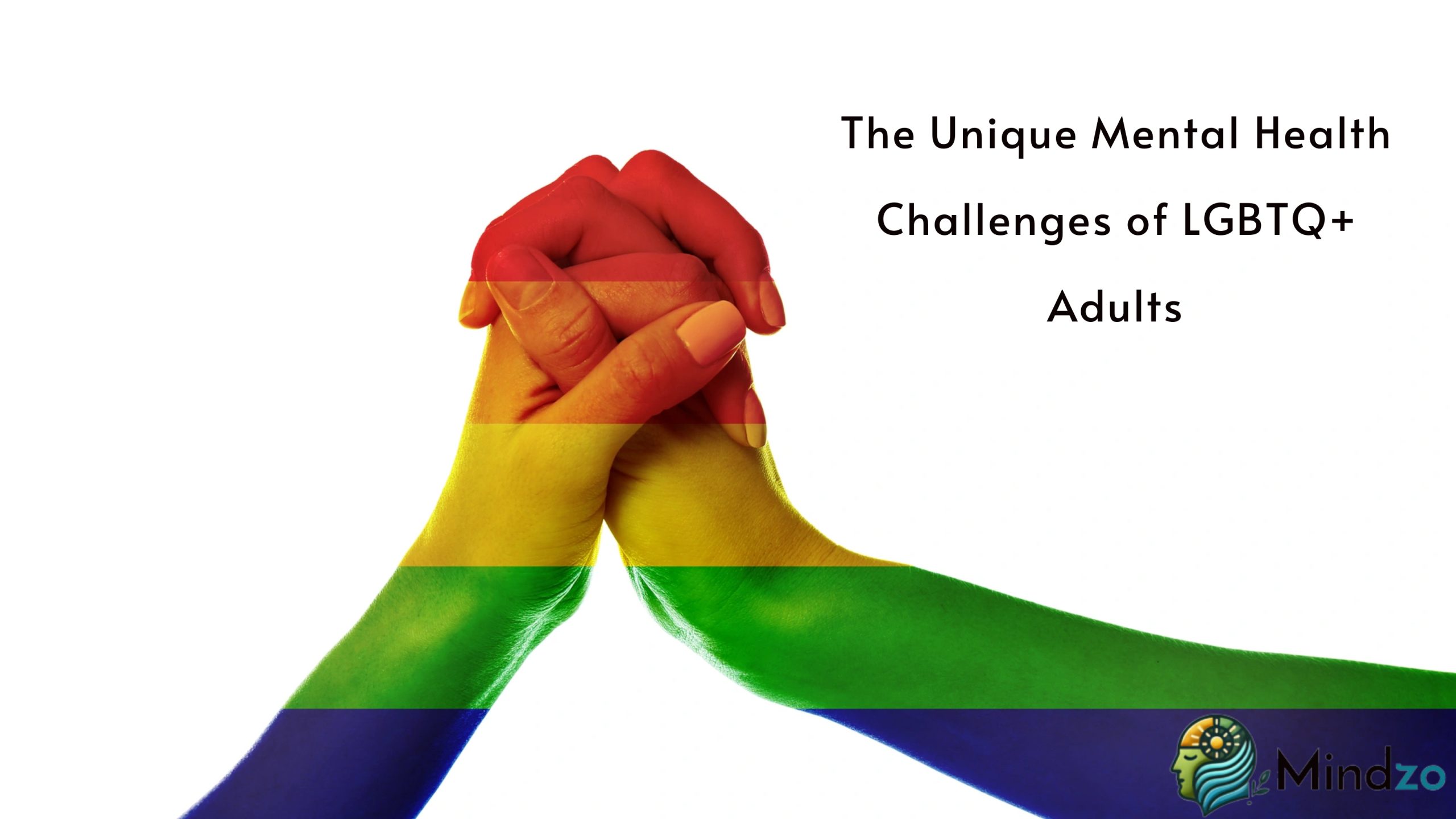The Unique Mental Health Challenges of LGBTQ+ Adults

Being part of the LGBTQ+ community can be a source of immense pride, strength, and connection. The journey toward self-acceptance and authenticity often builds remarkable resilience. However, it’s crucial to acknowledge that LGBTQ+ adults face distinct mental health challenges that require understanding, awareness, and targeted support.
These challenges don’t stem from being LGBTQ+ itself-there’s nothing inherently unhealthy about any sexual orientation or gender identity. Rather, the difficulties arise from living in a society that hasn’t always been accepting, from experiencing discrimination, and from navigating systems that weren’t designed with LGBTQ+ people in mind.
The Statistics Tell a Concerning Story
The numbers are sobering and demand attention. LGBTQ+ adults are more than twice as likely to experience mental health conditions compared to their heterosexual and cisgender peers. Depression and anxiety disorders are particularly prevalent, with rates approximately 2.5 times higher in the LGBTQ+ community.
Substance use disorders, suicidal ideation, and suicide attempts occur at significantly elevated rates. These aren’t just statistics-they represent real people facing real struggles, often in silence. Understanding why these disparities exist is the first step toward addressing them.
Understanding Minority Stress
At the heart of many mental health challenges faced by LGBTQ+ adults is a concept called “minority stress.” This term describes the chronic stress that comes from belonging to a stigmatized minority group. It’s not the same as everyday stress that everyone experiences.
Minority stress is unique, chronic, and socially based. It includes both external experiences-like discrimination, harassment, and violence-and internal processes, such as internalized homophobia or transphobia, concealing one’s identity, and constantly anticipating rejection or discrimination.
Imagine constantly evaluating whether it’s safe to hold your partner’s hand in public, wondering if being your authentic self will cost you a job opportunity, or worrying about how family members will react to who you truly are. This ongoing vigilance takes a profound toll on mental wellbeing.
Specific Challenges LGBTQ+ Adults Face
Discrimination and Stigma
Despite significant social progress, discrimination remains a daily reality for many LGBTQ+ people. This can range from subtle microaggressions-like assumptions about pronouns or relationship status-to overt hostility, harassment, or violence.
Discrimination occurs in employment, housing, healthcare, and public spaces. The cumulative impact of these experiences, both large and small, contributes significantly to mental health struggles. When discrimination is institutionalized through laws or policies, the message that LGBTQ+ people are “less than” becomes even more damaging.
Family Rejection and Relationship Strain
Family acceptance is one of the most powerful protective factors for LGBTQ+ mental health, yet many people face rejection from the very people who should provide unconditional love and support. This rejection can be explicit-being disowned or cut off-or more subtle, like refusing to acknowledge a partner or using incorrect names and pronouns.
The loss of family support, or even the fear of that loss, creates a unique type of grief and isolation. For many LGBTQ+ adults, chosen family becomes essential, but building that support network takes time and doesn’t fully replace the biological family connection many hoped to maintain.
Coming Out as an Ongoing Process
Coming out isn’t a single event-it’s a lifelong process. LGBTQ+ adults must repeatedly make decisions about disclosure in new situations: starting a new job, meeting new friends, going to medical appointments, or even casual interactions. Each situation requires assessing safety and making split-second decisions about authenticity versus self-protection.
This constant calculation is exhausting. Some people cope by being completely out in all contexts, which brings its own challenges. Others maintain different levels of disclosure in different areas of life, which can feel fragmented and inauthentic. There’s no perfect solution, and the ongoing nature of this decision-making contributes to chronic stress.
Healthcare Barriers
Healthcare experiences for LGBTQ+ adults are often fraught with challenges. Many providers lack adequate training on LGBTQ+ health issues. Transgender individuals face particular barriers, including difficulty finding providers who understand gender-affirming care, insurance denials for necessary treatments, and outright discrimination.
Even seeking mental health treatment can be complicated. Not all therapists are affirming or competent in working with LGBTQ+ issues. Past negative experiences with healthcare providers can make LGBTQ+ adults hesitant to seek help, even when they desperately need it. Being misgendered, facing judgment about sexual behavior, or having one’s identity pathologized creates trauma that compounds existing mental health challenges.
Intersection of Multiple Identities
LGBTQ+ people don’t exist in a vacuum. Those who also belong to other marginalized groups-people of color, individuals with disabilities, immigrants, or those from religious communities-face compounded challenges. This intersectionality means navigating multiple forms of discrimination and potentially feeling caught between different aspects of their identity.
For example, a queer person of color might face racism within LGBTQ+ spaces and homophobia within their racial or ethnic community. These layered experiences of marginalization significantly impact mental health and complicate the search for affirming support.
Unique Challenges for Transgender and Non-Binary Individuals
While all LGBTQ+ people face mental health challenges, transgender and non-binary individuals experience particularly high rates of depression, anxiety, and suicidal ideation. Gender dysphoria-the distress that comes from a disconnect between one’s gender identity and assigned sex-can be profoundly painful.
Access to gender-affirming care, including medical transition when desired, dramatically improves mental health outcomes. However, barriers to this care are substantial: financial costs, insurance restrictions, limited provider availability, and in some places, legal restrictions on accessing care. The politicization of transgender healthcare adds another layer of stress and uncertainty.
Internalized Homophobia and Transphobia
Growing up in a society with pervasive negative messages about LGBTQ+ identities often leads to internalizing those messages. Even after coming out and building affirming communities, many LGBTQ+ adults struggle with internalized homophobia, biphobia, or transphobia.
These internalized beliefs can manifest as shame, self-hatred, difficulty forming relationships, or engaging in risky behaviors. Working through internalized stigma is a common theme in therapy for LGBTQ+ adults and requires time, compassion, and often professional support.
The Impact of Social and Political Climate
The broader social and political environment significantly affects LGBTQ+ mental health. When rights are under attack through legislation, when public figures make disparaging comments, or when violence against LGBTQ+ people makes headlines, community mental health declines noticeably.
Conversely, positive representation in media, protective laws, and visible community support improve mental wellbeing. LGBTQ+ mental health doesn’t exist in isolation-it’s deeply connected to social acceptance and legal protections.
Protective Factors and Resilience
While the challenges are real and significant, it’s equally important to acknowledge the remarkable resilience within the LGBTQ+ community. Several factors protect against mental health problems and promote wellbeing:
Community Connection: Finding and connecting with other LGBTQ+ people provides validation, reduces isolation, and creates a sense of belonging. LGBTQ+ community spaces-whether physical or online-serve as havens where people can be authentically themselves.
Family Acceptance: When families are accepting and supportive, mental health outcomes improve dramatically. Even one supportive family member can make a significant difference. For those whose biological families aren’t supportive, chosen family fills this critical role.
Affirmative Therapy: Working with a therapist who is knowledgeable about and affirming of LGBTQ+ identities can be transformative. These professionals understand minority stress, don’t pathologize LGBTQ+ identities, and can help clients navigate unique challenges while building on their strengths.
Visibility and Representation: Seeing LGBTQ+ people represented positively in media, occupying positions of leadership, and living openly fulfilling lives provides hope and models for possibility. Representation matters because it counters negative narratives and shows diverse ways of being LGBTQ+.
Legal Protections: Non-discrimination laws, marriage equality, and other legal protections provide both practical security and a powerful message of equal worth. When society legally recognizes and protects LGBTQ+ people, mental health benefits.
Pride in Identity: Many LGBTQ+ adults find that embracing their identity fully, rather than seeing it as something to overcome, becomes a source of strength and pride. The journey toward self-acceptance often involves deep personal growth that builds resilience applicable to all life challenges.
Seeking Support and Treatment
If you’re an LGBTQ+ adult struggling with mental health challenges, know that you’re not alone and that help is available. Here are steps you can take:
Find LGBTQ+-Affirming Providers: Look for therapists who explicitly state they work with LGBTQ+ clients and understand minority stress. Many directories allow you to filter for LGBTQ+-affirming providers. Don’t settle for a provider who makes you feel uncomfortable about your identity.
Connect with Community Resources: LGBTQ+ community centers often offer support groups, counseling services, and connections to affirming providers. These spaces understand the unique challenges you face.
Consider Different Types of Support: Individual therapy, support groups, couples counseling (for LGBTQ+ partnerships), and family therapy are all valuable options depending on your needs.
Address Co-Occurring Issues: Many LGBTQ+ adults dealing with mental health challenges also struggle with substance use. Integrated treatment addressing both issues simultaneously tends to be most effective.
Know Your Rights: Understanding your rights regarding healthcare, employment, and housing can reduce anxiety and help you advocate for yourself effectively.
Build Your Support Network: Cultivate relationships with people who accept and celebrate you fully. These connections buffer against discrimination and provide essential emotional support.
A Message of Hope and Solidarity
Being LGBTQ+ comes with unique challenges, but it also comes with unique joys, perspectives, and strengths. The mental health disparities in the LGBTQ+ community aren’t inevitable-they’re the result of discrimination and stigma, which can and must change.
Your identity is valid, beautiful, and worthy of celebration. If you’re struggling, seeking help isn’t a sign of weakness-it’s an act of self-care and courage. The challenges you face are real, but so is the possibility of healing, growth, and thriving.
You deserve to live authentically, to love freely, and to experience mental wellbeing. You deserve providers who see your full humanity, communities that embrace you, and a society that protects your rights. While we’re not fully there yet, progress continues, and you don’t have to face these challenges alone.
Your mental health matters. Your wellbeing matters. You matter.
Resources
https://www.thetrevorproject.org
https://www.nami.org
https://www.hrc.org
https://mhanational.org
https://www.apa.org
https://www.samhsa.gov
-
 Beyond Words: The Emotional Medicine of a Simple HugOctober 27, 2025
Beyond Words: The Emotional Medicine of a Simple HugOctober 27, 2025 -
 Music’s Unique Therapeutic BenefitsOctober 23, 2025
Music’s Unique Therapeutic BenefitsOctober 23, 2025

Leave a Reply